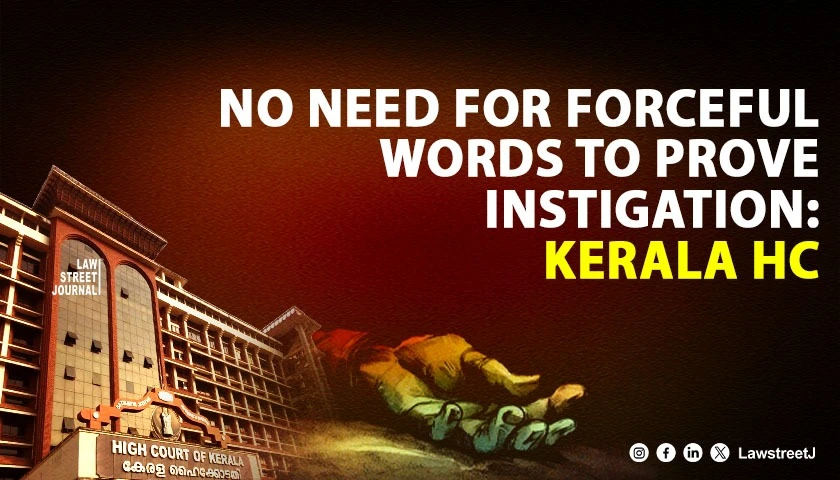Kerala: The Kerala High Court has delivered an important judgment clarifying that to establish the offence of abetment of suicide under Section 306 of the Indian Penal Code, it is not necessary that the words spoken by the accused must be capable of compelling the victim to commit suicide, and it would suffice if the instigation is suggestive of the consequence.
Justice V.G. Arun was hearing a criminal miscellaneous case challenging proceedings before the Judicial Magistrate of First Class, Chittur. After investigation, the police filed a final report alleging offences under Sections 306 read with 113 IPC.
The prosecution case revealed a tragic business dispute wherein the victim, Ramesh, had started a business venture called Mind Masters Technology Pvt. Ltd. along with his wife and the accused persons. The funds were raised by Ramesh from his proprietary concern, Solucion Limited. After forming the company, its day-to-day affairs were entrusted to the accused, but their alleged failure to handle matters properly resulted in an acute financial crisis.
It was alleged that the accused directed staff and creditors to approach Ramesh demanding payment and compelled him to meet these demands. Unable to withstand the pressure, Ramesh committed suicide at his parental house in the early morning of 22.10.2019 by setting himself on fire.
Senior Advocate S. Gopakumaran Nair, appearing for the petitioner, contended that the prosecution allegations, even if accepted entirely, were insufficient to attract the alleged offence. He argued that to prosecute abetment of suicide, “there should be instigation from his part and close proximity between the act of instigation and the commission of suicide,” relying on Prakash & Others v. State of Maharashtra and Gurcharan Singh v. State of Punjab.
The counsel further submitted that allegations of the petitioner making creditors demand amounts from Ramesh were false, arguing: “The suicide only indicates that Ramesh was a feeble-minded person with no willpower to face and get over the business crisis.” He contended that even if Ramesh was under mental stress, his act of escaping the crisis through suicide cannot result in prosecution.
It was also argued that the suicide note did not reveal any act of instigation, and the allegation of a telephone call on the ill-fated night was unsubstantiated, as call-data records were not seized. The defence emphasized that mens rea must be established for abetment offences.
Public Prosecutor Adv. Sanal P. Raj countered that circumstances made it apparent that Ramesh was driven to the extreme step due to treacherous acts and pressure exerted by the accused. He submitted, “The suicide note indicates that the final act was committed by Ramesh after answering the petitioner’s call.” He argued that proximity between the accused’s act and the suicide must be decided based on trial evidence.
Examining the evidence, the Court observed: “Here, the victim was under tremendous mental pressure by reason of the financial crisis faced by the company and his own proprietary concern.” The Court noted that forensic evidence confirmed the suicide note’s authenticity, which mentioned treachery by the accused and contained a significant closing statement that the petitioner had telephoned and threatened to “teach him a lesson.”
The Court stated: “In order to satisfy the requirement of instigation, it is not necessary that the words spoken must be capable of compelling the victim to commit suicide. It would suffice if the instigation is suggestive of the consequence.”
The Court emphasized that determining whether alleged acts were sufficiently proximate to have a clear nexus with the suicide “can be decided only on a wholesome consideration of the facts and circumstances.”
Drawing from Chitresh Kumar Chopra v. State (Govt. of NCT of Delhi), the Court explained that instigation may be inferred “where the accused by his acts or by a continued course of conduct creates such circumstances that the deceased was left with no other option except to commit suicide.”
The Court outlined that to prove abetment, the accused must have kept irritating or annoying the deceased by words, deeds, wilful omission, or conduct until the deceased was pushed forward, and must have intended to provoke or encourage the suicide. The Court noted: “Undoubtedly, presence of mens rea is the necessary concomitant of instigation.”
Applying these principles, the Court held: “Thus, for deciding whether there was incitement or instigation by the petitioner, appreciation of evidence is essential.” Citing Naresh Aneja v. State of Uttar Pradesh, the Court observed that High Courts should not conduct “a mini-trial or minute examination of the records” when exercising inherent powers under Section 482 CrPC.
The Court also noted that the entire set of documents produced with the final report was not made part of the criminal miscellaneous case.
Consequently, the Court dismissed the petition “without prejudice to the petitioner’s right to approach the trial court,” adding that if a discharge petition is filed, the trial court “is bound to pass a reasoned order thereon.”
Case Title: Sivadasan Nair K.G. vs State of Kerala




![Kerala HC Quashes 498A Dowry Harassment Case Against Live-In Partner, Citing Lack of Relative Status [Read Order]](/secure/uploads/2023/08/lj_5693_1057c042-1e57-4e27-8c9e-25af0ec38ec4.jpg)
![Watching porn on mobile: Kerala HC highlights importance of mother cooked meals, outdoor sports [Read Order]](/secure/uploads/2023/09/lj_9155_Parental_supervision_of_mobile_phone_usage.jpg)
![Lakshadweep MP Mohammed Faizal Disqualified from Lok Sabha After Conviction Suspension Plea Rejected by Kerala High Court [Read Notice]](/secure/uploads/2023/10/lj_9640_87b5fd97-0e05-4ff8-9a99-3be1e4446192.jpg)






